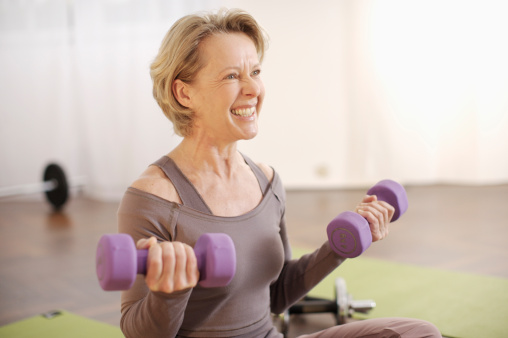 Osteoporosis, or “porous bones”, is a disease that weakens the bone structure, leading to the loss of bone mass and strength. The disease can lead to sudden fractures, usually in the back and hips.
Osteoporosis, or “porous bones”, is a disease that weakens the bone structure, leading to the loss of bone mass and strength. The disease can lead to sudden fractures, usually in the back and hips.
Andrew Markowitz, M.D., a menopause physician at Women’s Health and Menopause Center, says, “Due to the reduction of estrogen during perimenopause and menopause, researchers have found a direct relationship between menopause and osteoporosis.”
Often referred to the “silent disease,” because the bone loss typically occurs without any symptoms, most women don’t know they have osteoporosis until after a bone breaks. A simple strain, bump or fall can lead to a fracture.
Most women reach their maximum bone mass around the age of 30, and it naturally declines as they age. Women over the age of 50 are at the greatest risk of developing osteoporosis, and petite women also have increased probability. Family history can also play a role.
If you do have osteoporosis, don’t fret. Dr. Markowitz reminds women there are treatments for the disease. Hormone therapy, vitamins (like calcium and vitamin D), weight bearing exercises and certain injectable medications can help combat the progression of the disease.
To help prevent osteoporosis from occurring in the first place, women should:
- Exercise regularly, which helps increase muscle strength, helping to prevent bone less. Weight-bearing exercises, like walking, tennis and dancing, at least three to four times a week produce the best results.
- Eat high calcium foods. To maintain a low/average risk of developing the disease, doctors recommend taking at least 1,000 mg every day. Postmenopausal women should increase their calcium intake to 1,500 mg a day. Good sources of calcium are low-fat dairy products, fish, dark green leafy vegetables, orange juice and calcium-fortified foods, like bread.
- Take supplements. If you think you can’t get enough calcium in your regular diet, speak with your physician about your options first. Large amounts of calcium can increase a woman’s chance of developing kidney stones.
- Increase your intake of vitamin D, which helps the body absorb calcium. A mere 20 minutes of daily sun exposure can help jump-start the production of vitamin D in the body. If you live in a place without lots of sunlight, eggs, fatty fish and fortified milk are a good substitute. Dr. Markowitz recommends women, aged 50 to 70, take 400 to 800 IU of vitamin D a day, especially if you’re lactose intolerant.
Although there is no definite way to determining a woman’s bone structure and osteoporosis risk, most diagnoses are made through special x-ray methods. A densitometry x-ray can give your doctor a precise measurement of the amount of bone in various parts of the body.
Your Women’s Health and Menopause physician can monitor your bone density over the years, with annual screenings. At your next visit, be sure to discuss how your bone density can affect your overall health. Schedule your next appointment by calling 248-932-9223. Or, you can share how you fight against Osteoporosis on our Facebook page.
